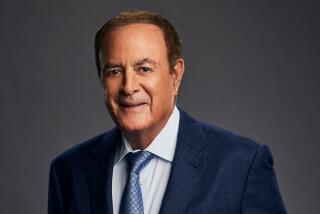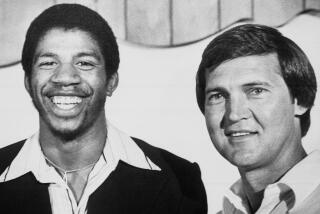What’s Next Is Bird’s Call
- Share via
INDIANAPOLIS — Three seasons is up already?
Three seasons was how long Larry Bird said he would coach, and when three seasons is up this week or next, that’ll be it, even if he did get the Indiana Pacers into three Eastern Conference finals and one big dance--even if they wind up in the winner’s circle with a wreath around their neck.
So if he doesn’t coach any more, what will Bird do with the rest of his life?
“Prepare myself for death,” he said laconically at a recent news conference, breaking up the room.
Thank heavens for all the fun the last three seasons. In a time when the NBA needed all the friends it could find, there was Bird and his Hick from French Lick charm.
Bird named himself that, but forget it. Among country folk, he’s one of the slick guys who understands you city fellers will automatically think you’re smarter than he is, the first time you hear him open his mouth.
Maybe he thought the same thing once, in the days when he bailed out of Indiana University and went to work on a garbage truck, but that was a long time ago. Now he’s so secure, he can even be humble in some contexts--like coaching--which is some trick since he has an ego as big as all outdoors.
“The most important thing is, no ego,” said Pacer guard Mark Jackson, asked why Bird has been so successful as a coach.
“It’s not my way or the highway. He respects us, we respect him. He’s simply more like a captain. He’s one of us. And when you have a team, sort of like we have, veterans that know how to get the job done, he just basically has to be the jockey.”
No ego?
Soon thereafter, Bird was asked if forward Austin Croshere, who had scored 22 points off the bench in the opener of the Eastern finals, reminded him of himself.
“No,” replied Bird, matter-of-factly. “I was a better player.”
A couple of days after that, when Croshere was slumping and suggesting, as players will, he should have played more, Bird was asked about that.
“Well,” said Bird, “he shouldn’t have played any.”
It’s not just the reserves, it’s everyone, from Jackson, who had to knock off his showboat shimmy; to Reggie Miller, who had to learn to think of himself as a franchise player instead of disappearing in big games; to Jalen Rose, who dogged it in practice.
Especially at first, Bird delegated a lot of X-and-O stuff to his assistants--he only has two instead of the modern complement of five or so--but NBA coaching is less about that than getting players to play hard and smart.
So the Pacers have, picking up the gauntlets Bird dropped on their toes.
“He’s no-nonsense,” says Sam Perkins.
“When you don’t work hard at practice, he’ll pretty much tell you you’re slacking. I wish he’d do it more, because there are times when guys have to realize that although they think they’re playing hard, they’re not. And when that happens, he puts his foot down. He says it once and then it seems like he doesn’t bother with you for a while, until you change.”
As for humility, well, there are limits. . . .
“He does say now if he was playing, he’d crack the small forwards’ behinds today,” said Perkins. “He’d eat ‘em alive, that’s what he always says. And that’s how he is.
“And I truly believe he would.”
Who Even Knew He Spoke English?
The Barefoot Boy Syndrome isn’t new. Lonely bumpkins have whiled away the hours playing basketball for decades, sometimes making it all the way from their hamlets, such as Jerry West, nicknamed Zeke from Cabin Creek by Elgin Baylor, a moniker West hated and spent years living down.
Bird arrived in Boston from Indiana State in 1979, having just engaged Michigan State’s Magic Johnson in the highest-rated basketball game of any kind and all time in the NCAA finals, on their way to revitalizing the downtrodden NBA. It would take years to find out how similar they were because at first, they seemed different in every way.
Johnson, 20, urban and hip, was sunny and lived for the spotlight. Bird, 23 and country, was taciturn and closed.
Johnson’s Lakers won the title in 1980, with Johnson starring at center in Kareem Abdul-Jabbar’s absence and lighting up the league.
After Bird’s Celtics won in 1981, completing a rise from 29-53 the season before he got there, a TV crew approached him in the airport the next day on his way out of town.
“One second, Larry?” asked the interviewer.
“One second’s over,” said Bird, walking on.
Imagine the surprise when Bird began to relax, even to become quotable. His agent started inviting reporters from other cities to interview Bird. Mike Littwin, then with The Times, spent an hour with Bird, after which Bird invited him to stay over and come back the next day for more.
Once the Chicago Tribune’s Sam Smith, misinformed about the practice schedule, showed up as the Celtics boarded the bus back to their hotel.
Bird said he’d ride in Smith’s compact car and do the interview on the way. Smith proceeded to get lost for more than 30 minutes before locating the hotel.
Bird then got out of the car and asked Smith if he had enough and wanted to come in.
Years later, Smith, who had gotten to know Bird, recounted the story and asked Bird how he could have been so patient.
“You know the old story,” said Bird, “just another Hoosier, looking for a ride.”
So Bird and Johnson warred throughout the ‘80s, with the league as beneficiary, since either the Celtics and Lakers, two of its most glamorous teams from two of its biggest markets, appeared in the finals for every year between 1980 and 1989, and met head-on in three.
Bird’s back went and he retired, soon after his star turn with Johnson on the original Dream Team in 1992. Bird kept his hand in as a Celtic consultant--but from Naples, Fla., where he was raising his family.
Five years later, tiring of golf, frustrated at being outmaneuvered in the front office, Bird began to wonder what else there might be out there for him. . . .
Once a Hoosier, Always a Hoosier
Meanwhile, back in Indiana . . .
The Pacers had reached peaks barely dreamed of under Larry Brown, who took the team that had never won an NBA playoff series to the Eastern Conference finals in 1994 and 1995.
Then, however, they were mired in Latter Larry Depression, that stage before he leaves when things are crumbling.
They were knocked out in the first round in 1996 and missed the playoffs in 1997. Brown, who had tried to interview in Dallas the year before, had obviously outlived his usefulness, but Pacer President Donnie Walsh needed someone else who was that good--and there wasn’t a long list, or a short one.
Word floated in that Bird was interested. Obviously, he’d be box office, but there was a problem: He had never coached, so who knew if he could?
“We met at the Final Four for the first time, face to face,” Walsh says. “I didn’t know what to expect going into that meeting, but I was super-impressed coming out of the meeting. And I told my owner after the meeting, ‘He’s the only guy we should consider, I think this guy’s perfect.’
“And I can tell you, from that first meeting, every single thing that he told me he would do is pretty much what he did. I mean, down to details.
“First, he said he would hire experienced assistants [Dick Harter, Rick Carlisle]. I wanted to hear that. He told me how to approach training camp. . . . He made me realize he knew a lot about our team, that he had watched us, that he felt he could get us into a championship series.”
Bird got them into the Eastern finals in 1998, but the Chicago Bulls beat them--only the second time in the 24 series in six title runs anyone took Chicago to a Game 7.
Last season, when the Bulls were gone and the Pacers were favored, the streaking New York Knicks upset them in Game 1, lost Patrick Ewing in Game 2 and still finished them off in six.
Then Walsh traded Antonio Davis for a high school kid named Jonathan Bender and it looked as if Bird would finish up presiding over a rebuilding program, rather than a title run.
That “last chance” stuff you hear now wouldn’t start for months, until the all-of-a-sudden unheralded Pacers went an inglorious 8-7 in November, hauled themselves back atop the East and hacked their way into the finals.
“We’ve been saying that for three years, but I think it’s true this year,” said Bird during the Knick series.
“With all the free agents we have, you don’t know what kind of team you’re going to have next year. I think it’s very important for this franchise to take the next step. . . . We’ve been in the Eastern Conference finals five times and they haven’t been able to get over the hump.”
Before they made it, all Bird ever said was that he wanted to get the Pacers to the finals. He didn’t say anything about winning, which never would have happened in Boston, where he always expected to.
Now he hopes, rather than expects. On the other hand, a berth in the finals and a chance would look pretty good to the 28 teams on vacation.
Friends say Bird is amused at questions about his future. He’ll go back to Florida, fish, play golf and, if he gets bored, something else will turn up for him, perhaps even paying another $3 million a year, which a Hoosier can always find a place for, next to his other millions.
“It’s the right move,” says Johnson. “Larry is smart. This is their shot. He knew it would be a three-year process, so why not walk away?
“How many free agents do they have? . . . It will be tough for them to get back. It’s the right time.”
Johnson also says he expects Bird to come back. Johnson says he’s going to get his own team and then they’ll go at it again, rivalry without end, amen.
More to Read
Go beyond the scoreboard
Get the latest on L.A.'s teams in the daily Sports Report newsletter.
You may occasionally receive promotional content from the Los Angeles Times.










